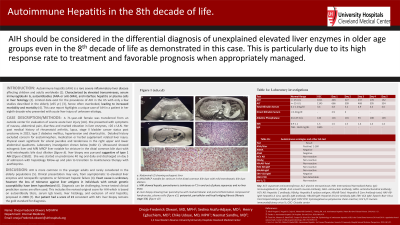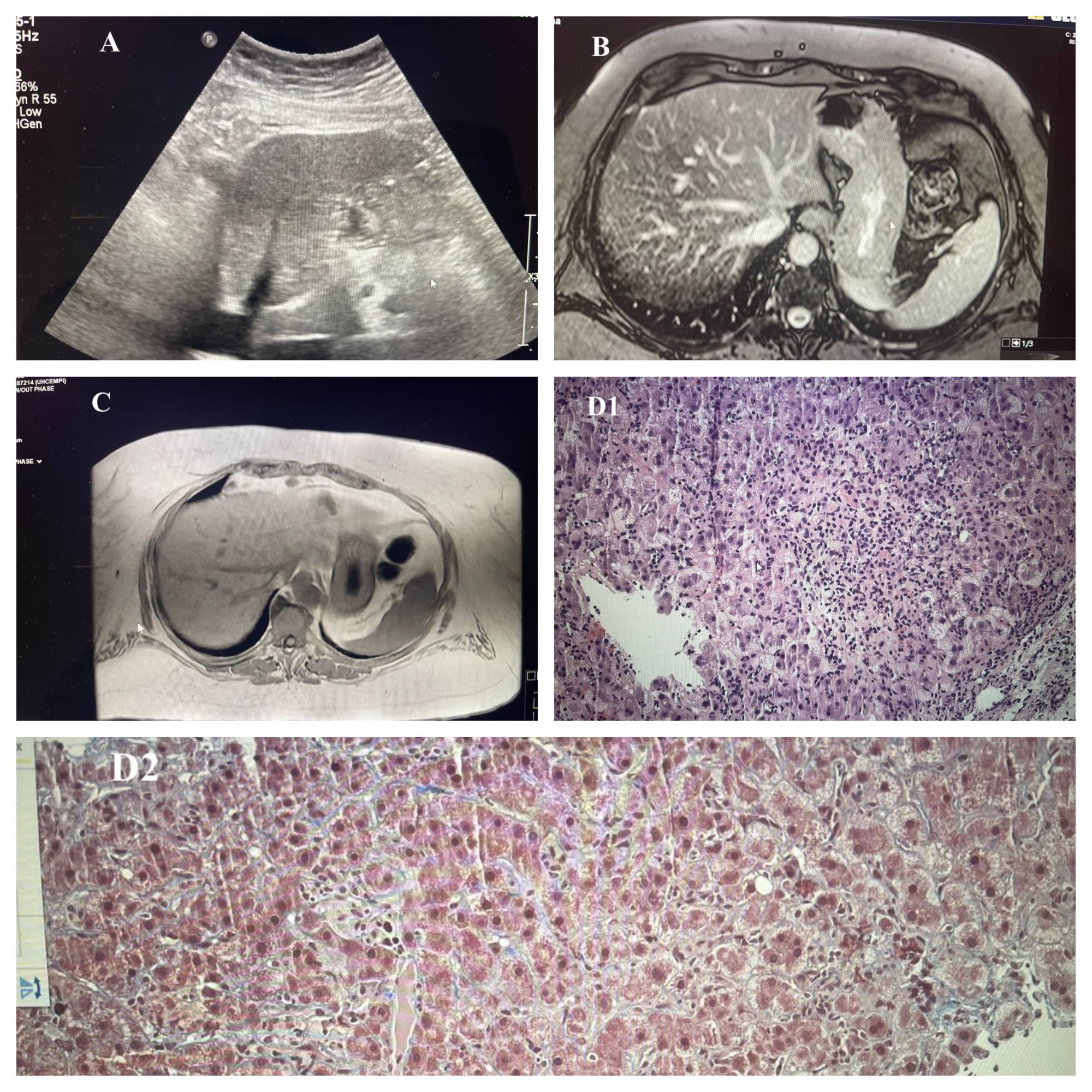Tuesday Poster Session
Category: Liver
P4736 - Autoimmune Hepatitis in the 8th Decade of Life
Tuesday, October 29, 2024
10:30 AM - 4:00 PM ET
Location: Exhibit Hall E

Has Audio

Onoja-Frederick Okwori, MD, MPH
University Hospitals Cleveland Medical Center, Case Western Reserve University
Cleveland, OH
Presenting Author(s)
Onoja-Frederick Okwori, MD, MPH1, Sedina Asafu-Adjaye, MD1, Henry Egbuchiem, MD2, Chike Udoye, MD, MPH1, Naemat Sandhu, MD1
1University Hospitals Cleveland Medical Center, Case Western Reserve University, Cleveland, OH; 2University Hospitals Geauga Medical Center, Chardon, OH
Introduction: Autoimmune hepatitis (AIH) is a rare severe inflammatory liver disease affecting children and adults worldwide (1). It is characterized by elevated transaminases, serum immunoglobulin G, autoantibodies (ANA or anti-SMA), and interface hepatitis or plasma cells in liver histology (2). limited data exist for the prevalence of AIH in the US with only a few studies described in the elderly (≥65 yr.) (3), hence often overlooked, leading to increased morbidity and mortality (4). This case report highlights a unique case of AIH in a patient in her eighth decade who presented with acute liver injury of unknown etiology.
Case Description/Methods: A 71-year-old female transferred from an outside center for evaluation of severe acute liver injury (ALI). She presented with symptoms of nausea, abdominal pain, diarrhea and marked elevation in liver enzymes, >20 x ULN. Her past medical history of rheumatoid arthritis, lupus, stage II bladder cancer status post urostomy in 2023, type 2 diabetes mellitus, hypertension and diverticulitis. Detailed history excluded concern for acetaminophen, medication or herbal supplement related liver injury. Physical exam significant for scleral jaundice and tenderness in the right upper and lower abdominal quadrants. Laboratory investigation shown below (table 1). Ultrasound showed echogenic liver and MRI MRCP liver notable for stricture in the distal common bile duct with mild extrahepatic bile duct dilation (figure b). liver biopsy was pursued suggestive of type 1 AIH (figure d1&d2). She was started on empirical antibiotics for uncomplicated sigmoid diverticulitis, prednisone 40 mg oral daily and discharged on day 5 of admission with hepatology follow-up and plan to transition to maintenance therapy with azathioprine.
Discussion: AIH is more common in the younger adults and rarely considered in the elderly populations (5). Clinical presentation may vary, from asymptomatic to elevated liver enzymes and nonspecific symptoms or fulminant hepatic failure (4). Exact cause is unknown, however the loss of tolerance against liver antigens in individuals with certain genetic susceptibility have been hypothesized (6). Diagnosis can be challenging, hence tested clinical prediction scores are often used. This includes the revised original score for AIH which is based on autoantibody titers, serum IgG levels, liver histology, and exclusion of viral hepatitis, proposed in 2008 (7). Our patient had a score of 23 consistent with AIH. liver biopsy remains the gold standard for diagnosis.

Note: The table for this abstract can be viewed in the ePoster Gallery section of the ACG 2024 ePoster Site or in The American Journal of Gastroenterology's abstract supplement issue, both of which will be available starting October 27, 2024.
Disclosures:
Onoja-Frederick Okwori, MD, MPH1, Sedina Asafu-Adjaye, MD1, Henry Egbuchiem, MD2, Chike Udoye, MD, MPH1, Naemat Sandhu, MD1. P4736 - Autoimmune Hepatitis in the 8th Decade of Life, ACG 2024 Annual Scientific Meeting Abstracts. Philadelphia, PA: American College of Gastroenterology.
1University Hospitals Cleveland Medical Center, Case Western Reserve University, Cleveland, OH; 2University Hospitals Geauga Medical Center, Chardon, OH
Introduction: Autoimmune hepatitis (AIH) is a rare severe inflammatory liver disease affecting children and adults worldwide (1). It is characterized by elevated transaminases, serum immunoglobulin G, autoantibodies (ANA or anti-SMA), and interface hepatitis or plasma cells in liver histology (2). limited data exist for the prevalence of AIH in the US with only a few studies described in the elderly (≥65 yr.) (3), hence often overlooked, leading to increased morbidity and mortality (4). This case report highlights a unique case of AIH in a patient in her eighth decade who presented with acute liver injury of unknown etiology.
Case Description/Methods: A 71-year-old female transferred from an outside center for evaluation of severe acute liver injury (ALI). She presented with symptoms of nausea, abdominal pain, diarrhea and marked elevation in liver enzymes, >20 x ULN. Her past medical history of rheumatoid arthritis, lupus, stage II bladder cancer status post urostomy in 2023, type 2 diabetes mellitus, hypertension and diverticulitis. Detailed history excluded concern for acetaminophen, medication or herbal supplement related liver injury. Physical exam significant for scleral jaundice and tenderness in the right upper and lower abdominal quadrants. Laboratory investigation shown below (table 1). Ultrasound showed echogenic liver and MRI MRCP liver notable for stricture in the distal common bile duct with mild extrahepatic bile duct dilation (figure b). liver biopsy was pursued suggestive of type 1 AIH (figure d1&d2). She was started on empirical antibiotics for uncomplicated sigmoid diverticulitis, prednisone 40 mg oral daily and discharged on day 5 of admission with hepatology follow-up and plan to transition to maintenance therapy with azathioprine.
Discussion: AIH is more common in the younger adults and rarely considered in the elderly populations (5). Clinical presentation may vary, from asymptomatic to elevated liver enzymes and nonspecific symptoms or fulminant hepatic failure (4). Exact cause is unknown, however the loss of tolerance against liver antigens in individuals with certain genetic susceptibility have been hypothesized (6). Diagnosis can be challenging, hence tested clinical prediction scores are often used. This includes the revised original score for AIH which is based on autoantibody titers, serum IgG levels, liver histology, and exclusion of viral hepatitis, proposed in 2008 (7). Our patient had a score of 23 consistent with AIH. liver biopsy remains the gold standard for diagnosis.

Figure: Figure 1 (a,b,c,d)
a. Abdominal US showing echogenic liver
b. MRI/MRCP notable for stricture in the distal common bile duct with mild extrahepatic bile duct dilation
c. MRI showed hepatic parenchyma is isointense on T1 in and out of phase sequences and no liver mass
d. Liver biopsy showing liver parenchyma with marked lobular and portal inflammation composed of lymphocytes, plasma cells (figure d1), periportal, pericellular and focal bridging fibrosis (fibrosis stage 3/4) (figure d2)
a. Abdominal US showing echogenic liver
b. MRI/MRCP notable for stricture in the distal common bile duct with mild extrahepatic bile duct dilation
c. MRI showed hepatic parenchyma is isointense on T1 in and out of phase sequences and no liver mass
d. Liver biopsy showing liver parenchyma with marked lobular and portal inflammation composed of lymphocytes, plasma cells (figure d1), periportal, pericellular and focal bridging fibrosis (fibrosis stage 3/4) (figure d2)
Note: The table for this abstract can be viewed in the ePoster Gallery section of the ACG 2024 ePoster Site or in The American Journal of Gastroenterology's abstract supplement issue, both of which will be available starting October 27, 2024.
Disclosures:
Onoja-Frederick Okwori indicated no relevant financial relationships.
Sedina Asafu-Adjaye indicated no relevant financial relationships.
Henry Egbuchiem indicated no relevant financial relationships.
Chike Udoye indicated no relevant financial relationships.
Naemat Sandhu indicated no relevant financial relationships.
Onoja-Frederick Okwori, MD, MPH1, Sedina Asafu-Adjaye, MD1, Henry Egbuchiem, MD2, Chike Udoye, MD, MPH1, Naemat Sandhu, MD1. P4736 - Autoimmune Hepatitis in the 8th Decade of Life, ACG 2024 Annual Scientific Meeting Abstracts. Philadelphia, PA: American College of Gastroenterology.
